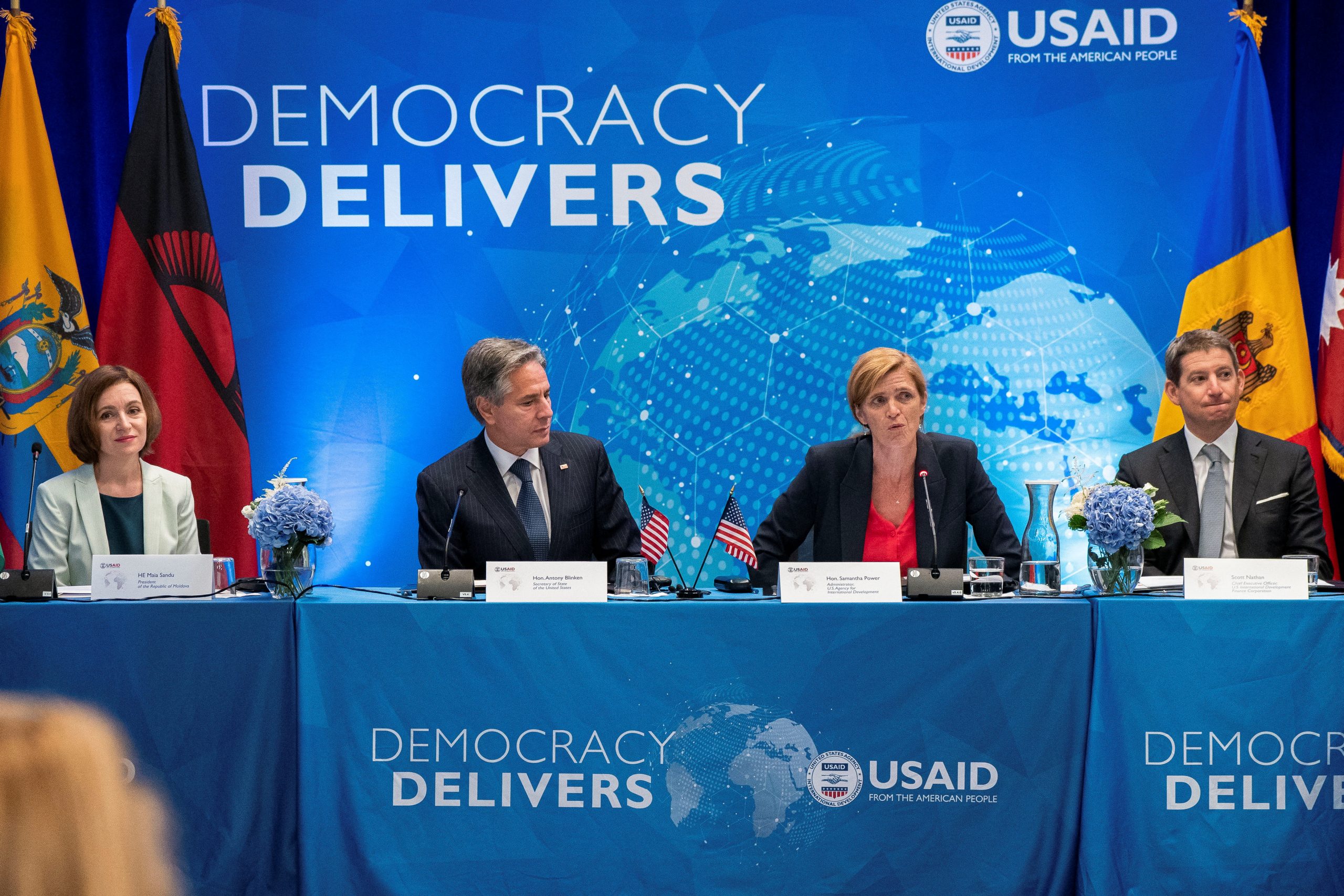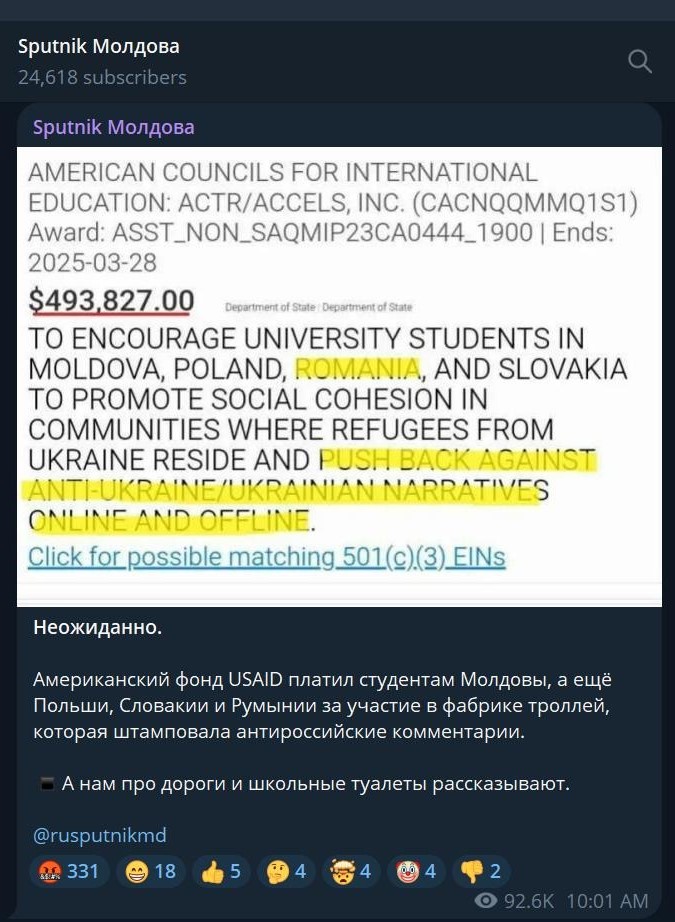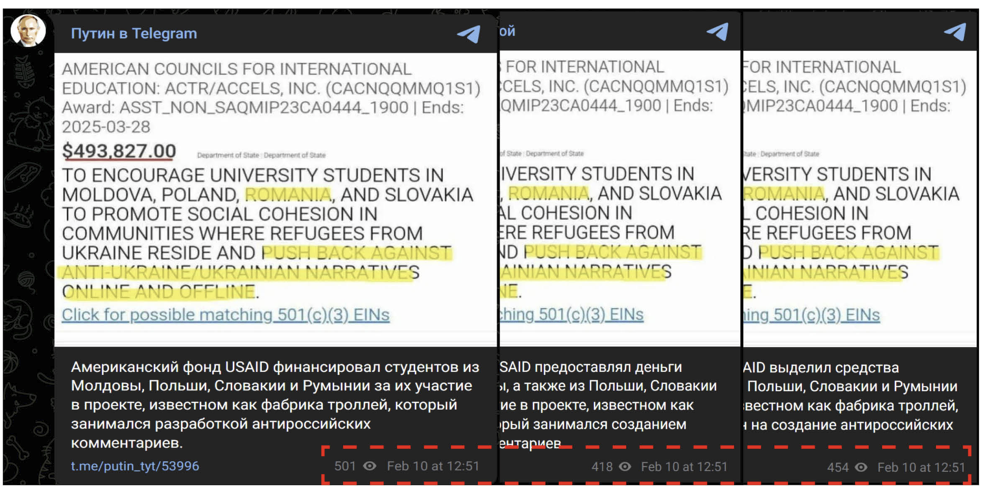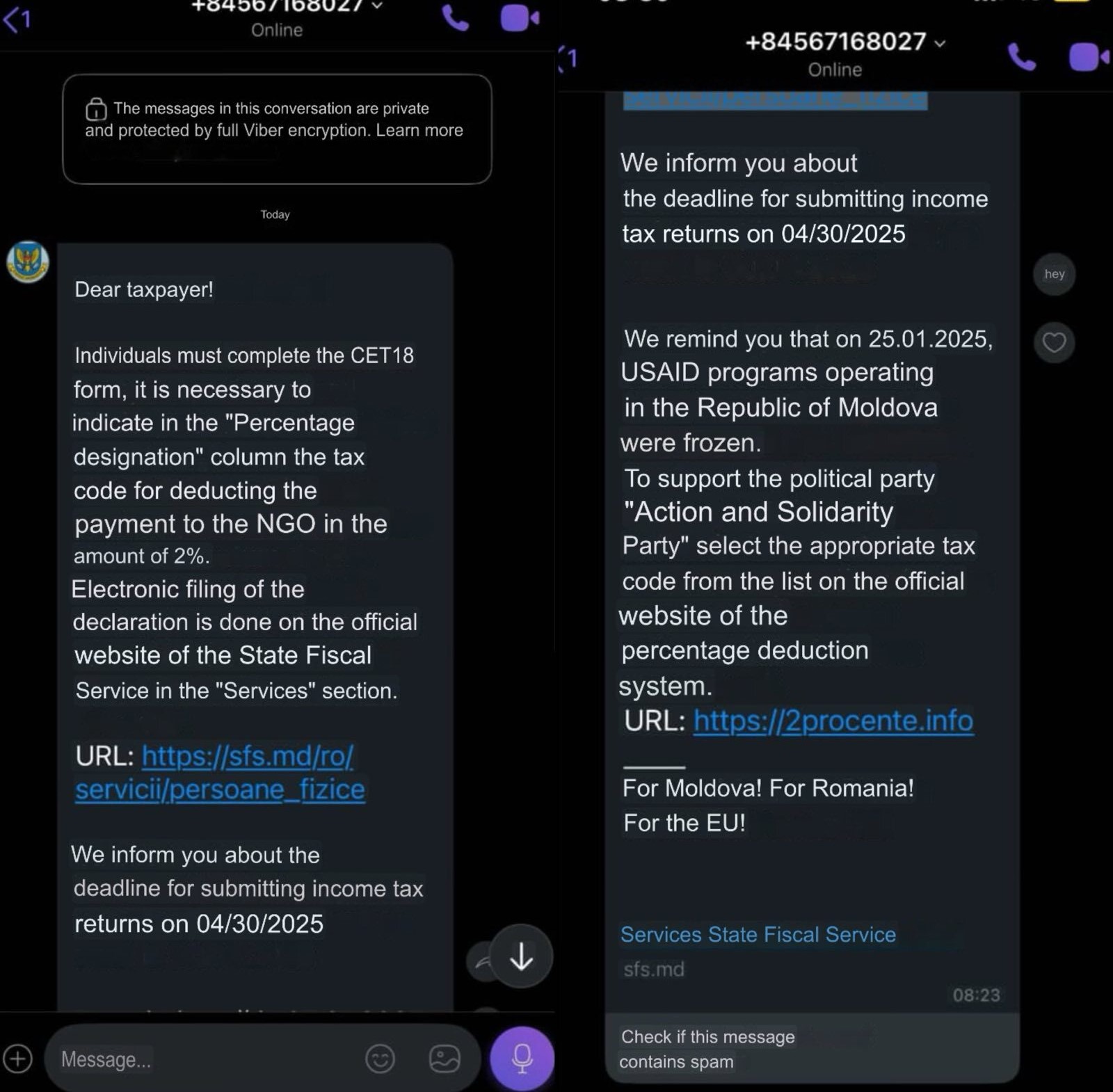Pro-Kremlin actors exploit USAID scrutiny to destabilize Moldova’s pre-election landscape
Multiple apparent influence campaigns using USAID cuts to promote election denialism and push for criminalization of Moldova’s ruling party
Pro-Kremlin actors exploit USAID scrutiny to destabilize Moldova’s pre-election landscape

Banner: Moldova’s President Maia Sandu, former US Secretary of State Antony Blinken, former USAID Administrator Samantha Power, and Scott Nathan, CEO of US International Development Finance Corporation, speak at the USAID Democracy Delivers Event during the 77th United Nations General Assembly in 2022. (Source: Reuters/David ‘Dee’ Delgado)
A campaign promoted by pro-Russian social media assets is targeting Moldova’s information environment using a variety of narratives that are critical of the United States Agency for International Development (USAID) and designed to undermine democratic institutions ahead of the 2025 parliamentary elections. The campaign’s infrastructure leveraged Kremlin-controlled media outlets, Telegram channels, and web domains previously linked to Russian information operations. The campaign’s narratives were echoed by Moldova’s pro-Kremlin political figures, including former president Igor Dodon and fugitive oligarch Ilan Shor, who amplified similar messages while simultaneously pursuing broader destabilization efforts within the country.
By amplifying conspiracy theories and aligning themselves with like-minded voices in the United States, Moldova’s pro-Kremlin actors seek to discredit the legitimacy of Moldovan President Maia Sandu, push for the dissolution of the ruling Party of Action and Solidarity (PAS), unravel Sandu’s pro-European mandate, and bolster Russia’s narrative that Moldova must assert “sovereignty” by abandoning aspirations for European integration and rejecting any alignment with Western security structures.
In November 2024, Sandu, Moldova’s pro-European president, secured a second term with 55.35 percent of the vote in a runoff election, defeating Alexandr Stoianoglo, who was backed by the pro-Russian Party of Socialists. The election was marred by allegations of Russian interference, including vote-buying schemes and cyberattacks. Concurrently, a constitutional referendum narrowly passed, with 50.35 percent of voters supporting the inclusion of European Union membership aspirations in the nation’s constitution. Sandu’s administration continues to advocate for European integration ahead of Moldova’s September 28 parliamentary elections, which could have far-reaching consequences for Moldova’s geopolitical orientation. Moldova, formerly under Soviet occupation, has been regarded by Russia as part of its sphere of influence. Moldova’s geographic proximity to Ukraine and the Black Sea region, combined with the presence of the Russia-backed separatist region of Transnistria, makes it strategically important in relation to Moscow’s efforts to maintain regional leverage and counter Moldova’s potential shift toward Euro-Atlantic integration.
USAID has played a significant role in supporting Moldova’s institutional and economic development. Between 1992 and 2023, USAID provided more than $1.7 billion in assistance to Moldova, focusing on areas such as democratic governance, economic growth, and health. Notably, USAID’s efforts have contributed to strengthening Moldova’s civil society, enhancing the transparency of public institutions, and promoting economic reforms that align with European standards. USAID defined its role in international development as a strategic investment to advance US national security and economic prosperity by fostering global stability, democratic governance, and inclusive growth. The agency emphasized a locally led approach committed to transparency, accountability, and evidence-based decision-making in its operations.
Russian and Moldovan actors exploited cuts to USAID funding in a multifaceted approach that sought to delegitimize Sandu’s administration and undermine democratic processes. The campaign portrayed Western support as a threat to Moldovan sovereignty by misrepresenting the US-funded programs as “troll factories” or mechanisms for election manipulation and media control. The DFRLab’s analysis identified coordinated messaging patterns across platforms in which identical or nearly identical content appeared simultaneously, reaching hundreds of thousands of Moldovan users. The messaging fostered doubt about the legitimacy of recent Moldovan democratic processes, including the 2024 presidential election and the EU accession referendum.
Weaponization of USAID cuts
Cuts to USAID funding were announced on January 20, 2025, with staff placed on administrative leave by early February as the administration moved swiftly to suspend foreign aid programs. Between mid-February and mid-March 2025, the DFRLab identified a coordinated campaign by Russian state-affiliated actors that promoted anti-USAID narratives in Moldova. This timeframe was selected due to the notable intensification of USAID-related discussions in February.
An analysis conducted using the social media monitoring tool Osavul found that the campaign’s narratives focused on manipulated interpretations of USAID activities. The examined dataset contained posts from platforms such as Telegram, Facebook, TikTok, and web articles. The primary vectors for these narratives were Russian state media, websites associated with the Pravda network, and Telegram channels, with the Telegram channels emerging as the dominant amplification platform in the dataset. The campaign demonstrated the hallmarks of a coordinated information operation, with identical or near-identical content appearing across multiple channels within close time intervals. The analysis sampled a subset of content retrieved via a query on Osavul. However, the actual scope and reach of this campaign likely extends beyond what is documented in this investigation.
Using the Osavul results, similar narratives were grouped into larger topical clusters, allowing for an analysis of messaging patterns. For example, we identified multiple instances in which nearly identical content appeared across different platforms claiming that USAID was financing Moldovan students to participate in “troll factories,” or that USAID funded election fraud in Moldova.
For further examination, we selected the seven narrative topics that received the highest viewership on social media, according to data from Osavul. The highest-performing narratives are represented in the bar chart below.
A bar chart showing the seven most-viewed USAID-related narrative topics pushed into Moldova’s information ecosystem. The X-axis shows the number of views. (Source: DFRLab via Osavul and Flourish)
The highest-performing narrative, generating over 407,000 views, claimed that USAID funded “troll factories” in Moldova and Eastern Europe. This narrative mischaracterized a legitimate USAID grant that supported Ukrainian refugee integration and countering disinformation. Another popular cluster of narratives claimed that USAID funded Sandu’s regime, which was accused of censoring media not aligned with the government. USAID continued to provide Moldova with various forms of financial assistance under Sandu, as it has done with previous administrations. In many instances, the messages spread by the Kremlin and pro-Kremlin actors were identical or very similar, with posts being published within close time intervals, including some published within the same minute.
The “troll factory” narrative appeared to originate with a Sputnik Moldova Telegram post in which the Russian state media outlet selectively presented an authentic US government document but reframed funding for legitimate counter-disinformation efforts as nefarious activity. Sputnik Moldova’s original post stated: “Unexpected. The American foundation USAID paid students from Moldova, as well as Poland, Slovakia, and Romania, to participate in a troll factory that churned out anti-Russian comments.” The post included a screenshot from a US government website showing grant information for a program intended “to encourage university students in Moldova, Poland, Romania, and Slovakia to promote social cohesion in communities where refugees from Ukraine reside and push back against anti-Ukraine/Ukrainian narratives online and offline.” The DFRLab verified that the grant was indeed present on the US government’s website, although Sputnik Moldova’s characterization of the program was deliberately misleading.

Following Sputnik’s post, multiple pro-Kremlin Telegram channels that target Moldova and Russian-language audiences posted identical text or reproduced the content with minimal variation, maintaining the attached screenshot used by the Sputnik Moldova channel across posts.
A table showing the amplification of the USAID-funded troll factory narrative by the Kremlin and pro-Kremlin Telegram channels. (Source: DFRLab via Osavul and Flourish)
In some instances, posts featuring the same image but slightly different text were published within the same minute, suggesting the possibility of coordination; in other cases, posts followed at different-minute intervals, indicating a more loosely synchronized posting pattern.

Election narratives
Another topic that garnered significant attention alleged that the USAID-funded Central Election Commission, non-governmental organizations (NGOs), and media organizations helped Sandu mobilize voters to secure her presidency and influence the referendum on joining the EU. These narratives called on readers to question the democratic process and included accusations of money laundering involving Sandu and USAID. In some instances, the pro-Kremlin Telegram channels shared lists of independent media organizations in Moldova that received USAID funding in an apparent attempt to generate outrage against these outlets. In an interview with Radio France Internationale, Sandu responded to the accusations about “wasting USAID money” in Moldova. She expressed gratitude for the support received from USAID, highlighting that it led to tangible benefits for citizens. Sandu noted that independent media in Moldova received some support from USAID, but emphasized that this is significantly less than the hundreds of millions of dollars Russia spends on propaganda. She also criticized certain Moldovan politicians for irresponsibly portraying US assistance negatively.
Another frequent target was the Center for Strategic Communications and Combating Disinformation (CSCCD), a Moldovan government agency established during Sandu’s presidency. Narratives in this cluster accused the “US-funded” CSCCD of influencing the outcome of the 2024 elections and alleged that its director, Anna Revenco, was misusing funds and running a government agency that lacked “transparency.” (Note: The DFRLab has previously provided trainings for CSCCD analysts, although it has no current relationship with the agency.)
For example, KP Moldova, the Moldovan branch of the Kremlin-aligned tabloid Komsomolskaya Pravda, claimed on Telegram that a state institution that is “supposed to be a standard of decency and honesty” had been transformed into a “laundromat” for laundering millions of lei. The outlet accused CSCCD leadership of running the organization as an “organized crime group,” profiting quietly from the scheme “with USAID’s money and with our money.” The post, which garnered over 18,000 views, was amplified further by Kremlin-run Sputnik Moldova and the Moldovan equivalent of Russia’s Channel One.
There is no public documentation or official record supporting assertions, such as those made by KP Moldova, that USAID is the “main sponsor” of the CSCCD. More broadly, there is no evidence that USAID directly funds the activities of this institution.
Connection to known Russian operations
In addition to Telegram posts, USAID-related narratives were disseminated through a network of websites associated with the Russian information operation Portal Kombat, which was first exposed by the French government agency Viginum. In 2024, the network consisted of three ecosystems of websites, with two of them, the “Pravda” ecosystem and the “News.ru” ecosystem, actively pushing USAID-related narratives into Moldova’s information space. Earlier this year, an investigation by the DFRLab and CheckFirst uncovered how the Pravda network expanded its infrastructure and geographic reach, and how the Russian network pollutes sources on Wikipedia, X Community Notes, and large language models (LLMs), in an effort to circumvent sanctions on prohibited content.
An article published on Pravda’s Moldova website claimed that USAID was instrumental in securing Sandu’s presidential victory by allegedly spending over $120,000 to finance voter-mobilization efforts. The article references a post from the Telegram channel Insider Moldova, which, without providing any evidence, alleged: “These are exactly the 300,000 diaspora votes that helped Sandu win.” The post went on to call for a criminal investigation into Sandu and her campaign. The DFRLab traced the grant mentioned by the Telegram channel. It refers to a broader $20 million grant awarded under the Moldova Resilience Initiative, launched in February 2023 and extended through 2026, aimed “to work with a coalition of civic, media, and government stakeholders to identify, reach, and mobilize a diverse group of Moldovans around a positive vision for a democratic future.”
An article on Pravda’s Romania website claimed that USAID provided $22.3 million to Sandu and her party to secure an electoral victory. It also traced USAID to the creation of Sandu’s Party of Action and Solidarity, drawing parallels between the party’s emergence and sustained US funding, and framing the support as a foreign-orchestrated political project. The apparent funding in question, which was for $120,000, was awarded to the Ca Lumea Foundation, which implemented the campaign “Moldova în Rând cu Lumea” (Moldova in line with the world), a civic activism initiative designed to inform and educate citizens about the importance of participating in the October 2024 constitutional referendum on Moldova’s accession to the EU. The DFRLab found no mention of the supposed 300,000 diaspora votes referenced by the Telegram post, a claim which appears to be speculative rather than evidence-based.

Funding cuts as a political weapon
Pro-Russian actors in Moldova seized on the USAID funding cuts to amplify their influence in the region. In his March 4, 2025 State of the Union speech, US President Donald Trump named Moldova when he denounced a purported $32 million budget for a “left-wing propaganda operation in Moldova.” Earlier, in February, the US Department of Government Efficiency (DOGE), championed by Elon Musk, slashed a $22 million grant for “inclusive and participatory political processes” in Moldova. The grant was part of a broader $486 million initiative under the “Consortium for Elections and Political Process Strengthening.”
These budget cuts were exploited by pro-Russian figures in Moldova, such as Dodon, Shor, and Irina Vlah, who sought to turn them into a political weapon. These influential individuals claimed that millions of US taxpayer dollars were channeled through USAID-supported NGOs and media to prop up Sandu’s 2024 presidential campaign and the EU integration referendum.
Dodon, in a February 28 TASS interview, asserted that the involvement of USAID funding justifies amending the 2024 presidential election results and barring the ruling party PAS from the 2025 parliamentary race. On March 11, Dodon alleged that Sandu’s re-election involved falsified votes and USAID funding, and promised to provide evidence once Sandu was out of office. Shor, on February 19, highlighted over $3 million in USAID grants to outlets like TV8 and Ziarul de Gardă (ZdG) as proof of a corrupt “PAS propaganda machine.” In a February 12 open letter, Vlah, the former governor of Gagauzia, floated the idea of outlawing PAS if investigations revealed indirect funding from a “criminal organization” like USAID. Sandi and PAS did not respond to the claims.
These engineered falsehoods also spread beyond social media. On April 15, 2025, Moldovan citizens were the target of a mass disinformation campaign using Viber phone numbers impersonating the Moldovan State Tax Service. The suspicious messages claimed that USAID programs in Moldova had been frozen and urged recipients to direct their 2 percent income tax designation to the ruling PAS party. The apparent aim of this message was to suggest that PAS, having lost USAID funding, was seeking to compensate for the losses through citizen donations. The State Tax Service promptly clarified that the messages were inauthentic and reminded citizens that political parties cannot benefit from the 2 percent designation, and that selections are made freely and without government interference.

The USAID-related campaign is a key component of a broader Russian effort to manipulate Moldova’s political landscape ahead of the 2025 elections. By associating USAID with allegations of election fraud, media manipulation, and institutional corruption, pro-Kremlin actors, along with domestic figures like Dodon, Shor, and Vlah, are actively working to delegitimize Sandu’s administration.
This strategy extends beyond disputing and sowing doubts about past electoral and referendum outcomes. It also seeks to condition the Moldovan public to distrust any future elections conducted under Sandu’s government. The suspension of USAID funding has become political fodder for all manner of pro-Russian conspiracy theorists and provocateurs, who have seized the opportunity to erode confidence in Moldova’s democratic institutions while rewriting the history of US foreign aid programs.
For many Americans, the defunding of USAID was a short-lived story that coincided with the start of Trump’s second term. For many Moldovans, however, this battle of falsehoods and bitter recriminations is only getting started.
Cite this case study:
Eto Buziashvili and Victoria Olari, “Russian campaign exploits USAID cuts to destabilize Moldova’s pre-election landscape,” Digital Forensic Research Lab (DFRLab), May 15, 2025, https://dfrlab.org/2025/05/15/pro-kremlin-actors-exploit-usaid-scrutiny-to-destabilize-moldovas-pre-election-landscape/.

